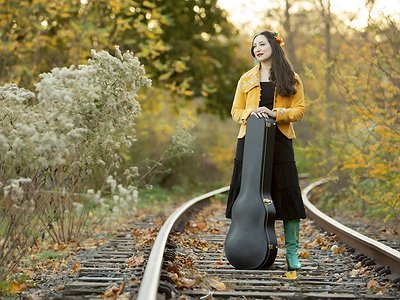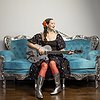Part 1
Name: Rachael Sage
Occupation: Singer, songwriter, producer, arranger
Nationality: American
Current release: Rachael Sage's new single “I Made A Case," featuring Howard Jones, is out via MPress.
If you enjoyed this Rachael Sage interview, visit her official website for more information. She is also on Instagram, Facebook, and twitter.
Where does the impulse to create something come from for you? What role do often-quoted sources of inspiration like dreams, other forms of art, personal relationships, politics etc play?
I’m inspired by just about everything. And since making music has really been my way of understanding and processing the world around me since I was a little kid, I know better than to rule out any unexpected source material.
I have absolutely composed songs after waking up from strange or jarring dreams, and in response to paintings, relationships and social issues. But more often than not my songs are responses to specific moments of epiphany, where a choice is being made to hopefully level up and become empowered in some way …
I’m most interested in human moments of transcendence and resilience, which are often (but not always) sparked by adversity.
For you to get started, do there need to be concrete ideas – or what some have called a 'visualisation' of the finished work? What does the balance between planning and chance look like for you?
I actually prefer to NOT have concrete ideas.
My process is generally very subconscious and impressionistic at first. The more I overthink what I create the less convincing it tends to be. That doesn’t mean I don’t refine it further or work hard on the craft part once initial ideas are flowing. But to get started I think it’s important to access emotions and instincts we tend to bottle up in everyday life - so planning tends to be the enemy of creativity for me.
We don’t plan how we fall in love - that’s what makes it magical. But we can do things to open ourselves up to self-expression like meditating or lighting candles or taking ourselves to the movies or going on a hike … and actually processing grief rather than pushing it down to the point where we can become numb.
Sometimes I do visualize paintings before I make them. But I almost never do that with songwriting - unless I’m hired to compose instrumental music for film or television which is a more deliberate process because you’re trying to deliver something that helps tell someone else’s story, rather than your own.
Is there a preparation phase for your process? Do you require your tools to be laid out in a particular way, for example, do you need to do 'research' or create 'early versions'?
Not really to be honest. I think we’re always doing field research as artists, just by perceiving life though that particular lens.
I try not to be overly precious about it because what I’ve found is that the more rules you make about when you can and can’t be creative, the less stuff you’ll make and the less the faucet will always be on so to speak. I’ve written some of my favorite songs while walking without any instrument but a voice in my head, and others in the shower or on a plane.
As a kid I always had to have a keyboard in front of me but I haven’t really been bound to that method in many years. I like to mix it up, and enjoy the challenge of limited tools in varied circumstances!
Do you have certain rituals to get you into the right mindset for creating? What role do certain foods or stimulants like coffee, lighting, scents, exercise or reading poetry play?
That’s a great question. I think I used to focus a lot on externals like that, especially in my 20s when I had roommates or a lot of noise around me.
But thankfully now I have quiet space at home which is half the battle. It can be hard to hear melodies in your head when competing with sirens and garbage trucks at all hours of the night! Earplugs are my best friend in a noisy city and I don’t hesitate to put them in if I’m at a cafe and trying to write or even just work on my record label activities. I have ADD so I do have a hard time focusing without reasonable quiet.
I do like to have a cup of tea generally and a lot of light. I like to see what I’m doing and am oddly not very inspired to create with the lights dimmed. That just makes me want to sleep because I’m always under-rested, ha!
What do you start with? And, to quote a question by the great Bruce Duffie: When you come up with a musical idea, have you created the idea or have you discovered the idea?
I start with whatever seems novel enough to me in the moment to hold my attention. It could be a phrase, or a melody, or even just a rhythm.
I wrote the title track to my current album “The Other Side” while taking a bath, banging on the bathtub as percussion (which we later recorded as a groove on the track!). No rules are my favorite rules!
When do the lyrics enter the picture? Where do they come from? Do lyrics need to grow together with the music or can they emerge from a place of their own?
I think similar to painting, lyrics can be poetic and abstract or pointed and determined. They can be used to express emotion in a way that is more nuanced and suggestive or can really hit you over the head with an anthemic hook or universal sentiment.
I think it’s sort of like asking “when do ingredients enter the recipe?” When it’s time to eat, you have to either grab something to go or cook something. It can all be delicious and sustaining but different types of songs need different types of lyrical approaches.
Growing up I wrote a lot of dance and pop music and now I tend to write more contemplative folk songs but I never rule anything out. I love punk-rock and I love opera and I love spoken word and I think what makes creativity interesting and fun is that you don’t always know where your own muse will take you.
Surprise is my favorite instrument!
What makes lyrics good in your opinion? What are your own ambitions and challenges in this regard?
What makes lyrics good is when they are relatable. Bob Dylan and Leonard Cohen may be poets but they also write songs we can all project our own emotions onto … they are masters holding up mirrors to our humanity (or lack thereof) in clever, inventive but also soulful ways.
The depth and layering of imagery and history amidst the immediacy of emotion is something I appreciate in many of the best lyricist from John Lennon to Neil Young.
I also really admire artists who are able to use humor and wit to underline their message but that’s very difficult. Elvis Costello is probably my favorite lyricist and the variety and dynamics of the pictures he paints with language boggle my mind in the lost delightful way.
It’s difficult to reconcile how many ideas can come from one musical mind. He’s like the Meryl Streep of songwriting! And for me, that’s always an ambition; to not repeat myself or fall prey to my own musical habits even if they’re comfortable … to explore new concepts and stylistic terrain but to still be authentically connected to the material.
I imagine this is why artists like Anais Mitchell, Sting, Cyndi Lauper and Sara Bareilles have been drawn to write for Broadway … they appreciate the challenge of telling another type of story, but still through their own unique musical lens.
For me, I’m still excited every time I write a new song like I was at 12 years old - but I also think it’s healthy to keep challenging oneself with different types of projects, especially as we get older.
Complacency is a very real thing and it’s definitely the enemy of creativity!
Many writers have claimed that as soon as they enter into the process, certain aspects of the narrative are out of their hands. Do you like to keep strict control or is there a sense of following things where they lead you?
Definitely the latter. Though as a producer and arranger I’m extremely specific and consider that to be a very different hat that I put on, than writing. Kind of like the difference between sketching in charcoal and painting in oils!
Often, while writing, new ideas and alternative roads will open themselves up, pulling and pushing the creator in a different direction. Does this happen to you, too, and how do you deal with it? What do you do with these ideas?
I try never to judge my ideas. They’re not diamonds, they’re just little seeds that may or may not grow into something more meaningful and relatable to others. And if they don’t, they stay safely in a journal or on a demo.
But in my opinion, alternative roads are the best roads anyway!
There are many descriptions of the creative state. How would you describe it for you personally? Is there an element of spirituality to what you do?
I find more spirituality in performing than in writing. But yes, in some instances I have felt that component enter into the process and it’s a humbling feeling.
More often than not though, for me it’s the communication of ideas in real time - with the benefit of an audience affecting the process - that feels most spiritual. Once in a blue moon I get that feeling alone while creating but I get it almost every time I play a show in one way or another. That’s why I imagine I’ll always perform … I have never had a deeper connection to music - or to a room full of strangers! - than on stage, preferably playing with others. The element of spontaneity combining with preparedness is a beautiful thing!
For that reason I love playing with jazz musicians - they always elevate my material and help me grow as a musician by forcing me to be completely present.






